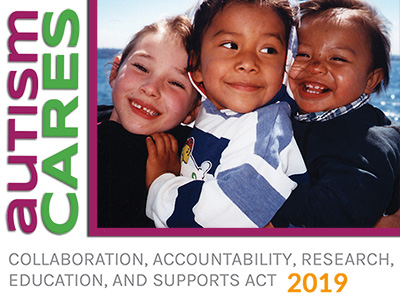September 19, 2019

|
| Download |
|
|
SILVER SPRING, MD - AUCD applauds Congress' passage of the Autism Cares Act of 2019, a bipartisan bill to expand research and coordination, increase public awareness and surveillance, and expand interdisciplinary health professional training to identify and support individuals with autism and their families. Passage of the bill, which occurred by voice vote, has been championed by Senators Enzi (R-WY) and Menendez (R-NJ) and Representatives Smith (R-NJ) and Doyle (D-PA), and reauthorizes CARES programs at NIH, CDC, HRSA, and IACC over the next five years
"AUCD is grateful to the bipartisan, bicameral leaders who helped shepherd this reauthorization and who advocate for children and adults on the autism spectrum and their families year-round," said AUCD Executive Director Andrew J. Imparato. "We are grateful to the self-advocates, family leaders, and professionals inside and outside the AUCD network who engaged with Congress to help them understand the importance of this reauthorization, and we look forward to continuing to engage in the activities that make a difference in the lives of autistic individuals and their families."
The prevalence of autism is growing. According to the Centers for Disease Control and Prevention Autism and Developmental Disabilities Monitoring (ADDM) Network, autism now affects one in every 59 children. The Autism CARES Act has shown significant progress in increasing the capacity of professionals to screen, diagnose, treat, and support individuals with Autism Spectrum Disorders (ASD). However, substantial gaps still remain, which is why it is so critical that the Autism CARES Act was reauthorized to sustain the momentum of the work that has begun under this law.
The membership of AUCD includes a national network-serving every state and territory-of 67 University Centers for Excellence (UCEDD), 52 Leadership Education in Neurodevelopmental and Related Disabilities (LEND) programs, and 14 Intellectual and Developmental Disabilities Research Centers (IDDRC). Together, these programs provide a direct national impact through direct services, the development of new professionals, and the use of new knowledge generated from research.
AUCD Board President Dr. Amy Hewitt stated during the House Health Subcommittee of the Committee on Energy and Commerce hearing, "My brother-in-law, Nathan, is 45 years old and has autism. He reminds me daily that early intervention is critical and that children grow up to become working adults who want good lives in their communities. We have so much to learn from autistic adults about the systems we create to support people across their lives. The reauthorization of CARES shows the commitment from each of you to provide a coordinated federal response to the needs of individuals with ASD in your districts throughout the U.S. This legislation has answered critical questions and addressed disparities through research, public health surveillance, and workforce development."
The Association of University Centers on Disabilities (AUCD), located in Silver Spring, MD, promotes and supports a national network of interdisciplinary centers on disabilities. The members of AUCD represent every U.S. state and territory. AUCD and its members work to advance policy and practice through research, education, leadership, and services for and with individuals with developmental and other disabilities, their families, and communities.
AUCD is available for contact, resources, and stories on the Autism CARES Act. Contact Rylin Rogers, Director of Public Policy at [email protected] or 240-821-9381.
###